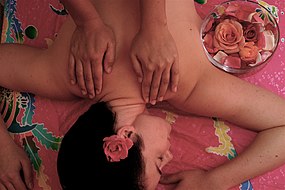Massage
| Massage | |
|---|---|
 |
|
| This article is part of the branches of Complementary and alternative medicine series. |
Massage involves working and acting on the body with pressure – structured, unstructured, stationary, or moving – tension, motion, or vibration, done manually or with mechanical aids. Massage can be applied with the hands, fingers, elbows, knees, forearm, feet, or a massage device. Depending on the application and technique used, massage is used to promote relaxation and well-being, and is beneficial in treating sports injuries and other problems affecting the musculature of the body such as postural misalignment and many painful conditions.
In professional settings massage clients are treated while lying on a massage table, sitting in a massage chair, or lying on a mat on the floor, while in amateur settings a general purpose surface like a bed or floor is more common. Aquatic massage and bodywork is performed with recipients submersed or floating in a warm-water therapy pool.
The word comes from the French massage "friction of kneading", or from Arabic massa meaning "to touch, feel" or from Latin meaning "mass, dough", cf. Greek verb (massō) "to handle, touch, to work with the hands, to knead dough". In distinction the ancient Greek word for massage was , and the Latin was .
Archaeological evidence of massage has been found in many ancient civilizations including China, India, Japan, Korea, Egypt, Rome, Greece, and Mesopotamia.
BC 2330: The Tomb of Akmanthor (also known as "The Tomb of the Physician") in Saqqara, Egypt depicts two men having work done on their feet and hands, presumably massage.
BC 722-481: Huangdi Neijing is composed during the Chinese Spring and Autumn period (the beginning of recorded history). The Nei-jing is a compilation of medical knowledge known up to that date, and is the foundation of Traditional Chinese Medicine. Massage is referred to in 30 different chapters of the Nei Jing. It specifies the use of different massage techniques and how they should be used in the treatment of specific ailments, and injuries. Also known as "The Yellow Emperor's Inner Canon", the text refers to previous medical knowledge from the time of the Yellow Emperor (approx 2700 BC), misleading some into believing the text itself was written during the time of the Yellow Emperor (which would predate written history).
...
Wikipedia
